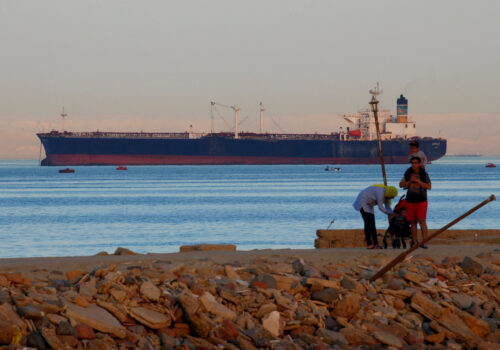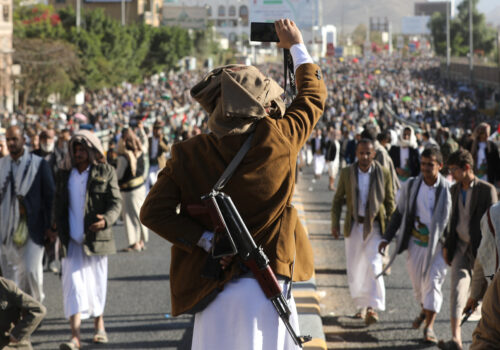The Red Sea attacks highlight the erosion of US leadership in the region
Six months after the Joe Biden administration launched Operation Prosperity Guardian to ensure freedom of navigation in the Red Sea, the biggest issue facing the White House is not the Houthi threat but the US failure to rally partners and allies behind its leadership. Fortunately, since the Houthis waged their attacks on ships crossing the Red Sea, US forces have succeeded in intercepting projectiles fired from Yemen. Physical damage has been limited and, contrary to initial fears, the economic impact has remained under control. Still, the international response to the Houthi threat is no success story. The Biden administration struggled to garner diplomatic support and military contributions.
European and Gulf frustrations with US strategy
First, European allies were skeptical. They expressed disagreements with Washington’s support for Israel’s operation in Gaza and questioned the strategic objectives of Operation Prosperity Guardian. As a result, on February 19, the European Union (EU) announced Aspides, its own maritime security operation.
The creation of Aspides stirred tensions among officials from both sides of the Atlantic. Unsurprisingly, the French government of Emmanuel Macron—a strong believer in Europe’s ability to offer an alternative to the US strategic framework—is at the forefront of this European initiative. In conversations I’ve had with US officials, they have argued that Aspides sends a message of disunity among NATO allies without providing a credible alternative at the military level.
SIGN UP FOR THIS WEEK IN THE MIDEAST NEWSLETTER
The European operation faces its own issues, particularly regarding the modest naval capabilities provided by the contributing nations. As of today, the operation merely relies on four warships to counter Houthi attacks. Europeans also suffer from limited air-defense capabilities. The French Navy has repeatedly used Aster 30 surface-to-air missiles to counter multiple Houthi ballistic missiles. The interceptions were successful, but one Aster system cost roughly $1.1 million. It is doubtful, in terms of logistics and finances, that European navies have the means to sustain a monthslong campaign of this scale. This highlights the disconnect between European ambitions in maritime security and the reality of their military resources.
The US response to the Red Sea crisis has also been met with distrust by the country’s Gulf partners. Out of the six members of the Gulf Cooperation Council, only Bahrain joined Prosperity Guardian. Specifically, Saudi Arabia and the United Arab Emirates (UAE) dismissed the US operation because of their dispute with Washington over the Yemen conflict that predated the Red Sea crisis.
Saudi Arabia and the UAE have been the largest contributors to the operation started in 2015 by Riyadh to oust the Houthis from Yemen. Both grew frustrated with the United States’ evolution regarding the war. In their eyes, Washington initially supported the Saudi-led operation in Yemen during the Barack Obama administration, but then Congress shifted and criticized Gulf states when they faced a stalemate on the battlefield with the Houthis. Later, President Donald Trump vetoed attempts by lawmakers to suspend US military aid to the Saudi coalition. But after Biden was elected in 2020, his administration removed the Houthis from the State Department terrorist list (they were reinstated since January). The White House then stopped providing logistical support to the Saudi coalition and announced, “this war has to end.”
In the following months, the Houthis revived attacks against the coalition, either on the battlefield or on the Saudi and Emirati territories. This forced Gulf states to compromise and enter talks to end the war in 2021. However, negotiations proved difficult, largely due to the reluctance of Houthi leaders to share power with the Saudi-backed Yemeni government.
As a result, the current US campaign against the Houthis is seen in Riyadh and Abu Dhabi as an operation limited by design and unlikely to solve their predicaments. Worse, their participation could turn against them, lead to a resumption of Houthi attacks on their cities, and derail the fragile talks in Yemen.
Asian powers dismiss the US operation in the Red Sea
Another key US partner, India, has also suffered from the Houthi attacks in the Red Sea. Dozens of ships heading toward India, or with Indian crews on board, have been targeted. As a result, the Indian Navy increased its patrols in the Red Sea and deployed five guided-missile destroyers and a maritime-patrol aircraft.
But India’s naval activities did not lead its government to join the US operation either. This is mostly the result of New Delhi’s desire to preserve its nonalignment tradition, both diplomatically and militarily. Even though Prime Minister Narendra Modi publicly supported Israel’s response to the October 7, 2023, Hamas attack, India also maintained good diplomatic relations with Iran—the primary supporter of both Hamas and the Houthis. At the operational level, the Indian Navy wants to retain freedom of action, which could be curtailed if the country joins a US-led operation.
More significantly, China and its economy also rely heavily on the Red Sea. Beijing refrained from intervening in the crisis and dismissed US offers to cooperate. Its position is based on the belief that the primary targets of the attacks are the United States and its allies. In March, China reportedly reached an agreement with the Houthis to ensure the safe passage of its ships. However, this nonaggression deal proved risky. On March 23, the Houthis fired four anti-ship ballistic missiles at a Chinese-owned oil tanker crossing the Red Sea. The attack happened only days after the reported agreement, and it was a blow to Chinese diplomacy. This may have been caused by misinformation, as the ship under attack had changed ownership a month earlier. Nevertheless, it suggests that relying on Houthi compliance is a perilous gamble for China.
The coming troubles for US Middle East policy
All in all, the Red Sea crisis highlights the United States’ inability to mobilize its partners behind its leadership. But this does not mean that another power has replaced Washington. The strategies pursued by all the stakeholders in the area have not compensated for the failure of the Biden administration.
Europeans are eager to keep a high profile in maritime security. In regions such as the Red Sea, the EU believes it can offer an alternative to the great-power competition. This may sometimes appeal to local partners growing uncomfortable with the US-China equation. However, securing maritime spaces such as the Red Sea requires naval capabilities that European countries cannot provide.
Meanwhile, Gulf states have raised their ambitions in past years. But they have yet to offer a credible solution for governance in the Red Sea. Some of this failure derives from the limitations of Gulf navies. Underfunded for years, they struggle to operate beyond missions to protect their coasts.
At the diplomatic level, Gulf monarchies have also been conspicuously absent. One could almost forget that Saudi Arabia created a Council for the Red Sea in 2020 to enhance security cooperation among eight littoral states. Back then, the new body indicated the Saudi desire to expand its influence in the Horn of Africa, but progress has been slow since its creation.
Finally, the Indian and Chinese strategies vis-à-vis the Houthi attacks reveal elements of continuity with their foreign policy orientations: acting alongside Western forces while cultivating New Delhi’s nonalignment and preventing entanglement in local disputes, while Beijing benefits—at least implicitly—from the US naval presence.
Eventually, the erosion of US leadership leads each player to push for its agenda at the expense of finding a collective framework. This then exacerbates political fragmentation—not only in the Red Sea, but across the Gulf and the Middle East. This trend puts aside the existing regional institutions and favors ad hoc coalitions that might compete with each other. This risks wasting stakeholders’ diplomatic and military resources, which has immediate implications for the success of Operation Prosperity Guardian. In the long term, these developments in the Red Sea also foretell the increased difficulties Washington has in shaping the security architecture for the Middle East.
Jean-Loup Samaan is a nonresident senior fellow with the Atlantic Council. He is also a senior fellow at the Middle East Institute of the National University of Singapore. Follow him on X: @JeanLoupSamaan.
Further reading
Thu, Feb 8, 2024
Houthi attacks on ships in the Red Sea add to Egypt’s economic troubles
MENASource By Shahira Amin
The decline in Suez Canal revenues has put further strain on Egypt's already faltering economy at a time when the country faces a severe foreign currency shortage.
Mon, Jan 24, 2022
How the Biden administration can assure regional partners in the wake of the Houthi attacks on the UAE
MENASource By William F. Wechsler
US President Joe Biden is right to reconsider his previous decision to withdraw the US terrorist designation of the Houthis.
Mon, Feb 26, 2024
I’m a Yemeni minister and I believe the Houthi designation is not enough
MENASource By
The Biden administration’s decision to revoke the Houthi terrorist designation contributed to the complexity of the Yemeni crisis. To avoid replicating the same scenario, a new approach must be taken to counter the Houthis.
Image: Oil tanker Marlin Luanda has caught fire 60 nautical miles southeast of Aden in Yemen after a missile attack by Houthi fighters based in Yemen on Jan 26, 2024. The ship's owner, Trafigura, said the Marlin Luanda was struck by a missile as it transited the Red Sea on Friday. Houthi brigadier general Yahya Saree called the Marlin Luanda a British tanker and said the attack was in support of the oppressed Palestinian people and in response to the American-British aggression against our country. Indian Navy photo handout taken from INS Visakhapatnam via EYEPRESS


